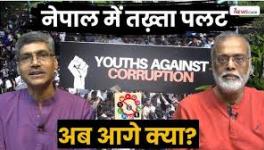Misogyny in Social Media, and How to Handle it?
Online 'critics' of Arnab Goswami and Barkha Dutt are not the same people, or if same, their methods of criticism are different.
If Arnab Goswami is censured for his obliviousness of the line between a journalist and a crusader, Barkha Dutt is attacked for her invovlement in the Radia tapes controversy. The only difference is that she is also given a piece of misogynic mind. Nira Radia, too, found herself at the receiving end of online sexism.
The social media is one of the outlets where the rape culture flourishes. One such social media tool, Facebook, has been on the wrong side of public displeasure when it gave a free pass to dozens of pages that glorify rape and threaten women's safety.
A safety clause on Facebook's terms reads as, “you will not bully, intimate, or harass any user.” Another clause bars users from posting any content that incites violence, contains pornography, hate speech, threats and even graphic violence. When change.org started a signature campaign against the pages that incite violence and sexual assault against women, the issue immediately appeared in mainstream media, making the billion-dollar social networking site take accountability. It took several hundred signatures from people around the globe for Facebook to take down a few of the reported pages. Among them were the pages that promoted rape and assault of women. Some of them were about the idea of raping women at knife-point, or telling men that women are just playing hard to get when they are trying to escape from them in dark alleys at night. The pages that were removed were only a few of the dozens that glamourised or trivialized rape or assualt against women. Alleging humour or joke, the rest of those pages were untouched by Facebook. Is Facebook giving out a message that hate speech against women and assualt on their bodies should be seen as a joke? It surely adds to trivializing the issues concerning women.
In an incident that took place in Iceland a few years ago, a woman named Thorlaug Agustsdottir reported to Facebook about a photoshopped image of hers that made it look as if she had been beaten. Facebook did not find the image meeting the criteria of 'graphic violence.' She later reported the image as 'hate speech or symbols,' and yet the picture was not removed. It was only after she reached a media outlet, and when the issue was given enough media attention that the picture was taken down.
Facebook has been criticized for its evaluation methods for banning pages. While pages that promote rape are of no issue, it has taken down a breast cancer awareness campaign page, marking it as 'pornography.'
What is to be understood here is that rape jokes have no context outside the rape culture, and therefore, to allow rape jokes is to promote the rape culture wherein women become mere objects of sexual satisfaction for the men, and where rape and other forms of violence against women are trivialized. When sexual assault is treated as humour, people who raise their voices against it are in turn criticized for stressing too much over a joke and for being small-minded.
Off late, Indian singer Chinmayi Sripada had been facing cyber bulling from people passing abusive, offensive and defamatory comments. She later approached the police with an online harassment complaint. The cyber crime cell arrested the bullies under Section 4 of Prevention of Women Harassment Act and section 66-A of the Information Techonology Act.
Section 66-A of the IT Act reads as, “Any person who sends, by means of computer resource or a communication device – (a) any information that is grossly offensive or has menacing character; (b) any information which he knows to be false, but for the purpose of causing annoyance, inconvenience, danger, obstruction, insult, injury, criminal intimidation, enmity, hatred, or ill will, persisitently by making use of such computer resource or a communication device.” The law is not only subjective, but also susceptible to misuse. It could be invoked by political parties against citizens as was seen in the case of the two girls in Maharashtra who were arrested by the local police. The Act is also condemned by several people for it limits their constitutionally-guaranteed right to freedom of expression.
This has led to a debate in the media on whether section 66-A is necessary to protect people against online threats, bullying, abuse, and defamation. In cases of defamation, Section 499 of the Indian Penal Code could be invoked which defines defamation as being committed: (a) Through (i) words (spoken or intended to be read) (ii) signs, or (iii) visible representations; (b) Which: are a published or spoken imputation concerning any person; (c) If the imputation is spoken or published with (i) the intention of causing harm to the reputation of the person to whom it pertains, or (ii) knowledge or reason to believe that the imputation will harm the reputation of the person to whom it pertains. Could the local police have invoked Section 499 of the IPC instead of Section 66-A of the IT Act?
Some other sections of IPC include Section 507 (prohibits criminal intimidation by anonymous communication), Section 503 (prohibits criminal intimidation), Section 292 and 293 (prohibit the distribution of obscene content). For other cases involving indecent representation of women, the Indecent Representation of Women (Prohibition) Act of 1986 could be invoked.
Considering the fact that there are ample number of laws dealing with protection of women and men, which could be invoked for issues arising online as well, is there a need for a separate 66-A to be part of the statute? Also, one cannot overlook the fact that this section of the Act has been often misused by the state or the political parties whether in the case of Aseem Trivedi being jailed; Mamtha Banerjee issuing an arrest warrant against a professor for forwarding cartoons; and the two girls who were arrested for stating their opinion about the discomfort faced by the public during the funeral of Bal Thackeray.
Going back to the issue of misogyny in social media, one cannot overlook the whole point of social media being a space for everyone to express their viewpoints, but violence, threats, and sexist remarks even when displayed online need to be tackled efficiently since for some people the cyber space is yet another medium of inciting gender-based violence and hatred.
Disclaimer: The views expressed here are the author's personal views, and do not necessarily represent the views of Newsclick
Get the latest reports & analysis with people's perspective on Protests, movements & deep analytical videos, discussions of the current affairs in your Telegram app. Subscribe to NewsClick's Telegram channel & get Real-Time updates on stories, as they get published on our website.
























